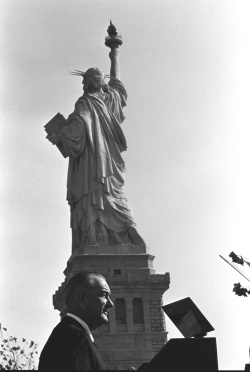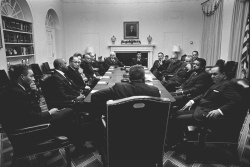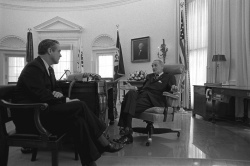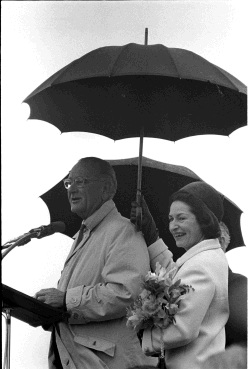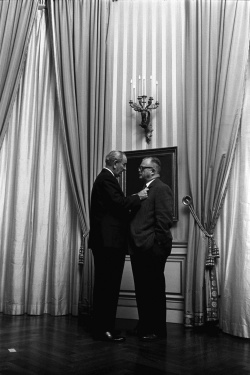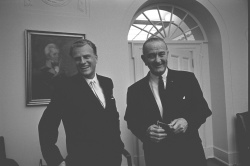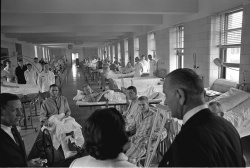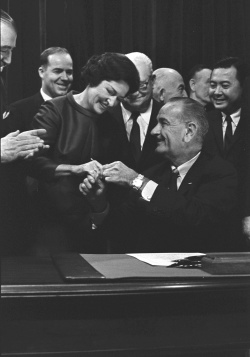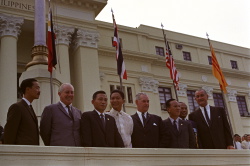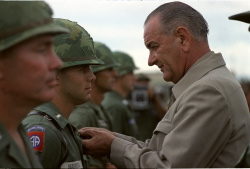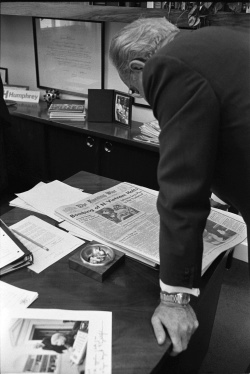1st2nd3rd4th5th6th7th8th9th10th11th12th13th14th15th16th17th18th19th20th21st22nd23rd24th25th26th27th28th29th30th31st
October 1st
On this day in 1960, LBJ was in bed all morning with a cold and about to lose his voice. He took no calls and used hand signals to communicate.
On this day in 1968, President Johnson gave a statement on the 10th Anniversary of the National Aeronautics and Space Administration.
“In the years ahead—as in the past decade-our foremost motive is to make men wiser and life on earth more meaningful. And on the milestone of this rewarding effort, we renew our dedication to the guiding principle we expressed 10 years ago at NASA’s launching: that our further mastery of space may continue to be ‘for the benefit of all mankind.’”
On this day in 1966, President Johnson had a telephone conversation with Willard Wirtz, Secretary of Labor. The men talked about appropriations for poverty bills, possible reshuffling of poverty program, possible backlash against the poverty programs, and the lack of support from governors, except for Nelson Rockefeller.
October 2nd
On this day in 1965, President Johnson signed the Water Quality Act, preventing water pollution by requiring states to establish and enforce water quality standards for interstate waterways.
“The clear, fresh waters that were our national heritage have become dumping grounds for garbage and filth. They poison our fish; they breed disease; they despoil our landscapes.
“No one has a right to use America’s rivers and America’s waterways that belong to all the people as a sewer. The banks of a river may belong to one man or even one industry or one State, but the waters which flow between those banks should belong to all the people.
“There is no excuse for a river flowing red with blood from slaughterhouses. There is no excuse for paper mills pouring tons of sulphuric acid into the lakes and the streams of the people of this country. There is no excuse—and we should call a spade a spade—for chemical companies and oil refineries using our major rivers as pipelines for toxic wastes. There is no excuse for communities to use other people’s rivers as a dump for their raw sewage.
“This sort of carelessness and selfishness simply ought to be stopped; and more, it just must be reversed. And we are going to reverse it.”
On this day in 1968, President Johnson signed the Wild and Scenic Rivers Act, establishing a national rivers system to protect and preserve many wild, scenic and recreational rivers. At the same time, President Johnson signed the National Trails System Act, creating a nationwide system of scenic and recreational trails.
On this day in 1968, President Johnson met with President Bombalbaye of Chad at the White House.
October 3rd
On this day in 1965, President Johnson signed the Immigration Act in front of the Statue of Liberty. This act repealed the restrictive national origins quota system which originated in 1921.
“Our beautiful America was built by a nation of strangers. From a hundred different places or more they have poured forth into an empty land, joining and blending in one mighty and irresistible tide.
“The land flourished because it was fed from so many sources—because it was nourished by so many cultures and traditions and peoples.
“And from this experience, almost unique in the history of nations, has come America's attitude toward the rest of the world. We, because of what we are, feel safer and stronger in a world as varied as the people who make it up—a world where no country rules another and all countries can deal with the basic problems of human dignity and deal with those problems in their own way.
“Now, under the monument which has welcomed so many to our shores, the American Nation returns to the finest of its traditions today.
The days of unlimited immigration are past.”
On this day in 1966, President Johnson had a telephone conversation with former President Dwight D. Eisenhower.
In the conversation, Eisenhower explained his recent statement on Vietnam, he contrasted the Korean and Vietnam Wars and talked about the use of atomic weapons. LBJ reminisced about Eisenhower’s policy on Vietnam.
October 4th
On this day in 1965, President Johnson met with Pope Paul VI at the Waldorf-Astoria Hotel in New York City. Their 46-minute talk included discussions of peace, civil rights, education, and poverty. The Pope was in New York to address the United Nations. His appearance marked the first time the head of the Roman Catholic Church had visited the United States.
On this day in 1967, President Johnson me with Prime Minister Giorgio Borg Olivier of Malta at the White House.
October 5th
On this day in 1965, President Johnson met with former President Dwight D. Eisenhower. They discussed the India-Pakistan situation, the political climate in the Dominican Republic, and how to explain to the American public Johnson’s upcoming gallbladder operation. That evening, the President informed the press about his upcoming gallbladder surgery and announced that the White House Conference “To Fulfill These Rights,” would be held in November; its objective would be “to help the American Negro fulfill the rights which, after the long time of injustice, he is about to secure.”
On this day in 1966, President Johnson had a telephone conversation with Defense Secretary Robert McNamara.
The talked about an injunction to prevent electrical workers from striking at General Electric because of the effect this would have on the Vietnam War. In addition, they discussed U.S. troop strength, enemy buildup, the bombing campaign, defense expenditures, and equipment shortages.
On this day in 1964, President Johnson met with President Gloria Macapagal-Arroyo of the Philippines at the White House.
October 6th
On this day in 1965, President Johnson signed the Heart Disease, Cancer, and Stroke Amendments of 1965.
“Its goal is simple: to speed the miracles of medical research from the laboratory to the bedside.”
On this day in 1964, President Johnson issued a proclamation declaring October 15 of each year as White Cane Safety Day.
“I urge civic and service organizations, schools, public bodies, and the media of public information to join in this observance with appropriate activities designed to promote continuing awareness of the significance of the white cane to blind persons.
“I call upon all our citizens to make every effort to promote the safety and welfare of our blind persons on the streets and highways, and thereby to contribute to their independence of spirit and their capability for self-management.”
October 7th
On this day in 1965, President Johnson signed the Water and Sanitation Systems in Rural Areas Bill.
“One of the pressing needs for rural America is the establishment of adequate water systems. This is vital for food processing; it is vital for preparing vegetables for the market; it is necessary for adequate fire protection; it is very desirable for almost every household use. And it is also a very powerful force for economic development. Land values go up. Homes are remodeled. New industries spring up. Existing industries expand.
“So the bill that we are signing into law today is, we think, going to help bring these new water systems into being.
“Another pressing need for rural America is for the construction of modern sewage treatment systems. Too many of these communities are pouring untreated wastes into their rivers and their streams—and the result is not only a pollution problem but a very serious health hazard as well. This bill will provide us with a major tool to correct that situation.”
On this day in 1965, A Salute to Congress at the White House included performances by Frederic March, Hugh O’Brian, Mahalia Jackson, Robert Merrill, Sheila MacRae, Anita Bryant, Bitter End Singers, Serendipity Singers, Your Father’s Mustache, Ned Odum Boys, American Light Opera Company, U.S. Marine Corps Band, Nat Greenblatt, and Ferde Grofe.
October 8th
On this day in 1964, President Johnson signed the Bill extending the Agricultural Trade and Assistance Act.
“The overriding fact is that the bill I have just approved will permit the Food for Peace program to continue uninterrupted for another 2 years. Both in its tangible and intangible benefits, this vital program deserves and, I believe, enjoys the overwhelming support of the American people. It has and will continue to receive the wholehearted support of this administration. If the past is any guide to the future, I am confident that Food for Peace will represent a growing force in our efforts to advance the cause of freedom throughout the world.”
On this day in 1968, President Johnson signed the Bill Extending the Food Stamp Program.
“I have signed today a bill that will carry-us far toward our goal of protecting every American against hunger or malnutrition-the Food Stamp Act amendments of 1968. This bill not only extends this vital program for 3 years, but it calls for a substantial increase in expenditures to meet the tragedy of hunger in America.”
October 9th
On this day in 1964, President Johnson spoke at a Democratic Party fundraising dinner in New Orleans, Louisiana.
“The point that I am making is simply this: The meaning of our victory in November will be just this—to assure this confident people of leadership with confidence to match their own. There is work to do, and we can either do it together, united, or we can do it divided, eating on each other.
“The platform on which I stand says: ‘The Federal Government exists not to grow larger, but to enlarge the individual potential and achievement of the people. The Federal Government exists not to subordinate the States, but to support them.’
“I quote the words, but I might offer them as my own, for those words I wrote into the platform. Those words are my beliefs and they have been my beliefs all my life. For so long as I serve in the White House, your Government will be dedicated not to encroaching upon the rights of the States, but to helping the States meet their responsibilities to their own people.
…
“The election is coming up November the 3rd. You have your choice. You have two parties. You have two tickets. You have men on both tickets who are experienced in the Congress, who served there many years. You don’t have to have anybody come down here and tell you what is right. You don’t have to have anybody come down here and tell you what you ought to do. You know what is best for you, and you go do it. And I am not even going to make a recommendation to you.
“If you think in your own heart that the course of wisdom for your country is this course, then you follow whatever you think it is. Because I believe that every other man is actuated by the same motives that I think I am actuated by.
…
“He wants to do what is right. I have never seen a man in Congress that I thought went there on a platform of doing what is wrong. He wants to do what is right. And I know the people of Louisiana want to do what is right.
“And I hope if you do what you think is right, that somehow or other it is the same thing that I think is right. But if it is not, I won’t question your patriotism, I won’t question your Americanism, I won’t question your ancestry.”
On this day in 1966, the Martha Graham Dance Company performed at a White House dinner for the Prime Minister and Mrs. Holyoake of New Zealand.
October 10th
On this day in 1967, President Johnson made remarks at the ceremony marking the entry into force of the Outer Space Treaty.
“We are here today in the East Room to proclaim the intention of 84 nations that this exploration shall remain peaceful. By adding this treaty to the law of nations, we are forging a permanent disarmament agreement for outer space.
“It outlaws the weapons of mass destruction from man’s newest frontier.
“It forbids military bases and fortifications on the moon and other celestial bodies.
“It prohibits the testing of weapons in space.
“It means that when man reaches the moon, he will land in a field of peace—not a new theater of war.
…
“And it is with this optimism this morning that, here with you, I greet this treaty. I see it as a hopeful sign that mankind is learning, however slowly, that wars are not inevitable; that national rivalry is not a permanent barrier to international understanding; and that a world of hostility and a world of hate need not be the abiding condition of mankind.”
On this day in 1967, President Johnson met with H.E. Lt. General Joseph A. Ankrah of the National Liberation Council of Republic Ghana at the White House.
October 11th
On this day in 1966, President Johnson signed the Child Nutrition Act. The Act extended and expanded the child nutrition program including new programs for school breakfasts and for food preparation and serving equipment.
On this day in 1968, President Johnson sent a message to the Apollo 7 astronauts Walter Schirra, Donn Eisele, and Walter Cunningham.
“Everything in the President’s office came to a halt as Foreign Minister Debre of France and I watched with mounting excitement the magnificent launch of the Saturn 1B. You can well imagine the great pleasure which filled the room as word came of your successful insertion into orbit.
“The path to the moon takes courage, ability, and devotion to our goals. You are making a major stride on this star-studded way.”
October 12th
On this day in 1967, President Johnson sent telegrams to the participating teams on the final day of the 1967 World Series, the St. Louis Cardinals and the Boston Red Sox.
October 13th
On this day in 1967, President Johnson made remarks upon presenting the Harmon International Aviation Trophies.
“It was 64 years ago next December, that two brothers from Dayton, Ohio went down to Kitty Hawk, North Carolina—and gave wings to the human race.
“That first flight lasted 12 seconds and covered only 120 feet. Today, here in the White House Rose Garden, we honor one man for flying three times the speed of sound. We honor two others for spending more than 94 hours in space.”
Captain James A. Lovell, Jr., USN, and Lt. Colonel Edwin E. Aldrin, Jr., USAF, shared in a joint award in recognition of their Gemini space flight in November 1966 which set a new record for time in space of over 425 hours and permitted important experiments in docking of space vehicles and extra-vehicular activity.
Alvin S. White, manager of flight research and development for Trans World Airlines, was awarded the trophy for piloting the XB-70 supersonic aircraft during 1966 in several flights at three times the speed of sound.
The Harmon International Aviation Trophies, named for the late Col. Clifford B. Harmon, pioneer American aviator, are awarded by the Clifford B. Harmon Trust and presented annually to the world's outstanding aviators for exceptional feats of individual piloting skill.
On this day in 1966, President Johnson met with Prime Minister Souvanna Phouma of Laos at the Presidential Suite, Waldorf Towers, in New York City.
On this day in 1967, President Johnson met with Prime Minister Shearer of Jamaica at the White House.
October 14th
October 15th
On this day in 1964, President Johnson instituted the first “White Cane Safety Day.” which celebrated the achievements of people who are blind or visually impaired.
On this day in 1964, President Johnson had a telephone conversation with Mrs. Johnson. Mrs. Johnson discussed ways to offer support to Walter and Marjorie Jenkins following his arrest on morals charges. They talked about Marjorie Jenkins’ view of the incident, and the need to balance personal feelings with the concerns of the office of the president.
On this day in 1966, President Johnson signed the act establishing the Department of Transportation and appointed Alan Boyd as its first secretary.
October 16th
On this day in 1964, President Johnson made remarks at the swearing in of Sargent Shriver as Director, Office of Economic Opportunity.
“The Economic Opportunity Act of 1964 is a good law. In my judgment, it is one of the best laws. The reason it’s a good law and the reason it is one of the best is because this good, competent man poured his very soul into it for days and weeks and months.
“This measure rejects the approach that America has outgrown. It rejects handouts, it rejects the dole. It rejects complacency. It rejects growing relief rolls. Instead, this measure keeps faith with and puts faith in the dignity and the capacity of the individual to grow, to bloom through education.
“The concept represents modern America at her best. The need is obvious for leadership which represents modern America at her best. And for that leadership, in my judgment, I have selected the best equipped by personality, by training, by head and heart and heels. I have selected the best personality in this country for that job. He was not an applicant for it. He urged me to take many more good men and he would have said ‘no’ to anyone except his president.
“But he is the kind of a person that goes where his President leads him because he loves his country that much. And our Nation is indebted to him already for the great feats of leadership that he has performed in this country.
“His work was brilliant in the ’60 political arena when John Fitzgerald Kennedy was selected to lead us. His performance and the contributions that he made in helping to man this Government with men of high character, deep conviction, great purpose, is almost unbelievable. And I am so proud that those men are staying to help me.”
On this day in 1960, LBJ stayed in bed all day and went to Homer Thornberry’s for dinner.
October 17th
October 18th
On this day in 1964, President Johnson gave a radio and television report to the American People on Recent Events in Russia, China, and Great Britain.
“On Thursday of last week, from the Kremlin in Moscow, the Soviet Government announced a change in its leadership.
“On Friday of last week, Communist China exploded a nuclear device on an isolated test site in Sinkiang.
“Both of these important events make it right that your President report to you as fully and as clearly and as promptly as he can. That is what I mean to do this evening.”
On this day in 1968, President Johnson signed the Radiation Control for Health and Safety Act of 1968.
October 19th
On this day in 1966, President Johnson attended the first day of the Manila Conference in the Philippines.
October 20th
On this day in 1965, President Johnson signed the Clean Air Act Amendments and Solid Waste Disposal Bill.
“We made a hopeful beginning toward solving this problem with the Clean Air Act of 1963. Today, with the signing of the Clean Air Act Amendments and Solid Waste Disposal Act, we are redoubling our efforts.
“This act will require all 1968 model automobiles—including the foreign models that are sold here—to meet Federal control standards for exhaust.
“This bill creates a Federal research and technical assistance program to seek ways of disposing of the millions of tons of solid wastes that we generate each year.
“This bill gives us the tools to halt pollution before it starts in new industries.”
On this day in 1964, President Johnson had a telephone conversation with the Reverend Billy Graham. Reverend Graham told LBJ had had been praying for him. The President discussed his problems with USSR, China, and Walter Jenkins’ arrest. President Johnson invited Reverend Graham to the White House Saturday night and to hold services on Sunday.
October 21st
On this day in 1965, President Johnson visited injured servicemen at the Naval Hospital in Maryland who had returned from Vietnam.
“I am sorry you are here, but there are a good many folks that are living better and enjoying freedom because you are. And I am glad that the citizens of this country are made up of men like you.
…
“I just can’t sum up in any words of mine how proud I am of the Marines, the Navy, the Army, the Air Force, and the Coast Guard, and the fellows that never look back. And when I feel pretty blue at night, and I issue the orders that you carry out, I do it with a heavy heart. But I never see one of your performances that I am not proud of you, and I wanted to come and tell you that before I checked out.
“Good luck to you. Tell all your families—your wives, your children, your mothers, and your fathers—that the President of your country is mighty proud of you.”
The President spoke at 1 p.m., during an informal visit to Ward 6-C of the Naval Hospital, Bethesda, Maryland., shortly before his return to the White House following his gall bladder surgery. The patients included Marines and naval personnel who had been wounded in Vietnam.
On this day in 1968, President Johnson accepted the new Presidential Limousine commissioned by the Secret Service.
“So, on behalf of the next President and this President, certainly in honor of the Secret Service organization and the Ford Motor Company, I am glad to receive this automobile this morning. It is the best that the Ford Motor Company can do, and that is saying a lot.”
October 22nd
On this day in 1965, President Johnson signed the Highway Beautification Act. The act helped states control billboards and junkyards and encouraged scenic and roadside development along major highways.
“Now, this bill does more than control advertising and junkyards along the billions of dollars of highways that the people have built with their money—public money, not private money. It does more than give us the tools just to landscape some of those highways.
“This bill will bring the wonders of nature back into our daily lives.
“This bill will enrich our spirits and restore a small measure of our national greatness.”
On this day in 1968, President Johnson signed the Gun Control Act of 1968, regulating the firearm industry and owners.
“Some of you may be interested in knowing—really-what this bill does:
“It stops murder by mail order. It bars the interstate sale of all guns and the bullets that load them.
“It stops the sale of lethal weapons to those too young to bear their terrible responsibility.
“It puts up a big ‘off-limits’ sign, to stop gunrunners from dumping cheap foreign ‘$10 specials’ on the shores of our country.
“Congress adopted most of our recommendations. But this bill—as big as this bill is—still falls short, because we just could not get the Congress to carry out the requests we made of them. I asked for the national registration of all guns and the licensing of those who carry those guns. For the fact of life is that there are over 160 million guns in this country—more firearms than families. If guns are to be kept out of the hands of the criminal, out of the hands of the insane, and out of the hands of the irresponsible, then we just must have licensing. If the criminal with a gun is to be tracked down quickly, then we must have registration in this country.
“The voices that blocked these safeguards were not the voices of an aroused nation. They were the voices of a powerful lobby, a gun lobby, that has prevailed for the moment in an election year.
“But the key to effective crime control remains, in my judgment, effective gun control. And those of us who are really concerned about crime just must—somehow, someday—make our voices felt. We must continue to work for the day when Americans can get the full protection that every American citizen is entitled to and deserves—the kind of protection that most civilized nations have long ago adopted. We have been through a great deal of anguish these last few months and these last few years—too much anguish to forget so quickly.
“So now we must complete the task which this long needed legislation begins. We have come a long way. We have made much progress—but not nearly enough.”
On this day in 1965, President Johnson had a telephone conversation with Arthur Goldberg, the U.S. Ambassador to the United Nations.
The President discussed his concerns about foreign aid for India and Pakistan and the need for nations to help themselves. The two men talked about the origins of the Alliance for Progress in the Eisenhower Administration, the need for land and tax reform in Latin America, and LBJ’s statement on the Foreign Aid Bill.
October 23rd
On this day in 1960, Mrs. Johnson attended the funeral of her father, T.J. Taylor, at the Karnack Methodist Church. Taylor died after a long illness.
On this day in 1937, LBJ’s father, Sam Ealy Johnson, Jr., died.
On this day in 1964, President Johnson made remarks on the 19th Anniversary of the United Nations.
“In these nineteen years the United Nations has done well. Nineteen years after the League of Nations was founded, in 1938, the world’s hopes for peace were dying in the shame of Munich. Today the United Nations is strong. Our hopes for peace are high.”
October 24th
On this day in 1966, President Johnson attended the Manila Conference of SEATO nations on the Vietnam War at Manacanang Palace in Manila, Philippines.
On this day in 1967, President Johnson met with El Hadj Ahmadou Ahidjo, President of Cameroon at the White House.
October 25th
On this day in 1968, President Johnson signed a Bill to Establish a National Memorial to Woodrow Wilson in the Smithsonian Institution.
“I have today signed S. 3174, to establish a National Memorial to Woodrow Wilson in the Smithsonian Institution.
“Under the guidance of a distinguished board of trustees, I am confident that the Woodrow Wilson International Center will further the ideals of scholarly excellence and of international understanding that guided the life and work of the 28th President of the United States.”
On this day in 1968, President Johnson signed a Bill Relating to Traffic in or Possession of Drugs Such as LSD.
“I am signing into law a bill to increase the penalty for the sale or manufacture of LSD, and to impose, for the first time, a penalty for its possession.
“Under this bill the illegal manufacture, sale or distribution of LSD and similar drugs is made a felony, punishable by 5 years in prison and a $10,000 fine. The illegal possession of such a drug is made a misdemeanor punishable by up to 1 year in prison and a $1,000 fine.
“All Americans interested in effective law enforcement will take satisfaction that this needed bill is becoming law today. It is measures like this—and not talk about crime-that strengthen the hand of our police and give our families protection.”
October 26th
On this day in 1966, President Johnson traveled to Cam Ranh Bay, South Vietnam. The President reviewed the troops, awarded service decorations, including awarding the Distinguished Service Medal to General William Westmoreland, and visited with top commanders in Vietnam, and wounded troops at the base hospital. Every American in each ward was given a Purple Heart by the President.
On this day in 1967, President Johnson began a multi-day meeting with President Diaz-Ordaz of Mexico at the White House.
October 27th
On this day in 1967, President Johnson dedicated the Theodore Roosevelt Memorial in Washington.
“If Theodore Roosevelt had wanted any memorial at all, he would have wanted it here—in this wild little island in the center of a historic river—where his statue is sheltered in the trees. May our people always remember the generous, passionate spirit that is memorialized here. May it inform and strengthen all of us in our hours and our time of our greatest trials.”
October 28th
On this day in 1960, LBJ went to the LBJ Ranch from Austin with Homer Thornberry; had dinner with his staff, Pat Ferguson, Murray Fromsom, and Billy Becker; and attended a rally at Marble Falls that evening.
On this day in 1960, President Johnson released a statement saying that a nationwide survey he had made of key Democratic leaders disclosed prospects of a Democratic landslide in presidential and congressional races. According to this statement, he spent the morning in telephone conferences with Democrats throughout the country and worked on a paper on outer space.
October 29th
On this day in 1966, President Johnson gave remarks at Chulalongkorn University, Bangkok, before signing the International Education Act. The President spoke at 10:36 a.m. at Chulalongkorn University in Bangkok, Thailand, where he was awarded an honorary degree of Doctor of Political Science.
“Our goal is an elementary one. It is this: to give each man in the world a chance to seek the highest and the deepest of the human experience, as he sees fit.
“You are doing that today here in Thailand.”
October 30th
On this day in 1967, President Johnson wrote a message to the American Bar Association’s Special Committee on Crime Prevention and Control.
“As you know, I consider the war against crime one of the top priority concerns of my Administration. The Safe Streets and Crime Control Act—now being considered by the Congress—would provide needed assistance to local communities to support their law enforcement efforts.
“I am encouraged to know that the American Bar Association is focusing on law enforcement as a primary area of its activity. Your eminent organization can spearhead a program of action through State and local bar associations that can assist our States and cities in improving the administration of justice. For the front lines in the war against crime are in the streets and alleys of the local communities across America.”
October 31st
On this day in 1968, President Johnson ordered a halt to all bombing of North Vietnam.
“It was made just as clear to North Vietnam that a total bombing halt must not risk the lives of our men.
“When I spoke last March 31st, I said that evening: ‘Whether a complete bombing halt becomes possible in the future will be determined by events.’
“Well, I cannot tell you tonight specifically in all detail why there has been progress in Paris. But I can tell you that a series of hopeful events has occurred in South Vietnam:
“The Government of South Vietnam has grown steadily stronger.
“South Vietnam’s Armed Forces have been substantially increased to the point where a million men are tonight under arms, and the effectiveness of these men has steadily improved.
“The superb performance of our own men, under the brilliant leadership of General Westmoreland and General Abrams, has produced truly remarkable results.”

